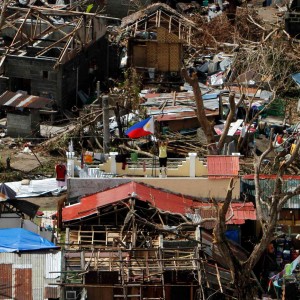PDRF continues Yolanda rehabilitation efforts
More livelihood opportunities, new classrooms and housing facilities are being rolled out in Yolanda-hit communities as the Philippine Disaster Recovery Foundation (PDRF) strengthens partnerships with the Department of Trade and Industry (DTI) and international non-government organizations.
A year after Supertyphoon “Yolanda” slammed central Philippines, PDRF continues to implement its rehabilitation programs aimed at bringing local economies back to normal.
Livelihood
“Our efforts have transitioned to target more long-term and sustainable impacts within the affected communities. The goal is not just to rebuild but also to help people stand on their own feet and aspire for even better living conditions,” said PDRF president Rene Meily.
PDRF, for instance, is distributing startup grants and livelihood equipment to various micro-enterprises in Tacloban City, as well as fiberglass motorized boats for Ormoc fishermen who lost their livelihood due to last year’s typhoon.
These grants were provisioned through the support of civic and business initiative US Philippines Society.
Education
After distributing more than 3,000 school supply packages to elementary school children in Tacloban through PLDT’s Sack ‘o Joy Program, PDRF has also been bridging support from NGO National Federation of Filipino American Associations (Naffaa) Region V in Colorado, US Philippines Society and Embracing the World Foundation to build new classrooms and repair school buildings in Salvacion Elementary School in Ormoc, San Jose Elementary School in Tacloban and other schools in Capiz and Antique.
Shelter
With approximately 4.1 million people displaced and 1.1 million houses destroyed by Yolanda, PDRF has intensified its efforts to address the sizeable need for quality shelter and transitional housing facilities.
Partnering with Filipino-American entrepreneur Vonz Santos and Relief NGO Operation Compassion, PDRF has deployed an initial batch of 50 “butterfly houses” and 150 indigenous housing facilities in various resettlement areas in Leyte.
More sustainable alternatives to tents and bunkhouses, these butterfly houses are steel-framed and compact units that can be unfolded into immediately livable housing structures.
On top of these programs, PDRF has also been working on other development clusters to address gaps in the health facilities, as well as in the disaster preparedness and environmental resilience measures of disaster-stricken areas.
It has also been working closely with the Office of the Presidential Assistant for Rehabilitation and Recovery (Oparr) to complete programs for areas with no development sponsors.
Earlier this year, Oparr launched the “adopt a town” approach to efficiently bridge private sector support for 24 Yolanda-hit areas that need continuous rehabilitation funding.
PDRF is the country’s major permanent private sector consortium for disaster management.
It is led by its co-chairs—Manila Archbishop Luis Antonio Cardinal Tagle, PLDT Chair Manuel Pangilinan and Ayala Corp. Chair Jaime Augusto Zobel de Ayala.

